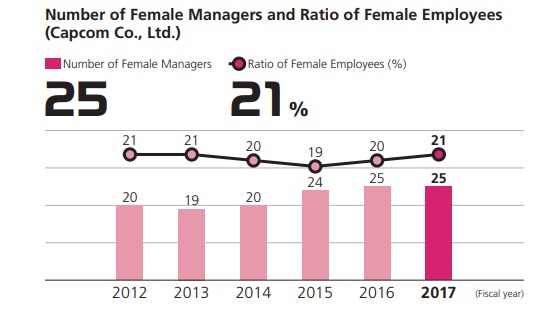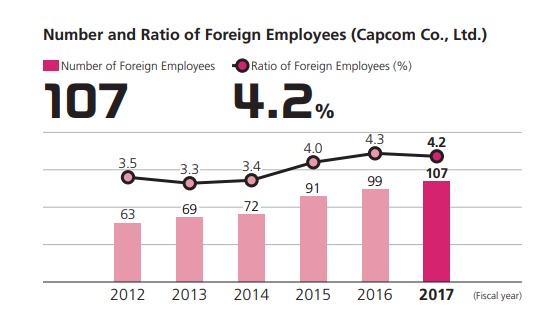Capcom‘s annual report reassured shareholders regarding Resident Evil 2, but their report was much more than an IP highlight reel. A large portion of it was dedicated to “Society and Capcom,” involving the relationship with its employees, the community at large, and even the environment. As far as staff diversity, Capcom is working to hire more women and non-Japanese workers.
Capcom aims to increase its number of women workers by improving maternity leave/childcare and initiating a General Employer Action Plan to assure that ‘at least 20% of all new graduates hired” and “at least 15% of managers” are women. It’s worth noting that Capcom also opened Capcom Juku in April 2017, to provide all employees with a childcare options to combat “long day care waiting lists” and a “lack of preschools.”
In terms of providing an environment that facilitates women,we introduced systems enabling women to take a leave of absence before and after giving birth, childcare leave and shortened working hours, and promote their use throughout the Company. In fiscal 2017, 25 employees took childcare leave, six of whom were men, and 100% of eligible women took childcare leave (fiscal 2016: 3 men and 100% of 23 women took leave). A high percentage of women returned to work afterwards: 25 returned in fiscal 2017— 96.0% if those still on leave are excluded. This is an increase over last fiscal year (95.6%, or 22 women, returned to work in fiscal 2016). As a result, despite it being said that Japan’s gaming industry is generally dominated by men, women account for roughly 21% of Capcom’s workforce, and 25 (10.3%) of Capcom’s managers are women. In accordance with the execution of the Act on Promotion of Women’s Participation and Advancement in the Workplace, in 2016 we formulated the General Employer Action Plan, which seeks to achieve two things: (1) having women comprise at least 20% of all of new graduates hired, and (2) having women comprise at least 15% of managers. In recognition of Capcom’s efforts toward improving the workplace environment for women, since 2014 we have earned the “Kurumin” mark, the symbol of a “company supporting childcare,” from the Ministry of Health, Labour and Welfare.
The number of women who hold management positions at the company has increased by 25% since 2012, from 20 to 25 women in 2018. However, Capcom seems locked near its minimum quota for female representation at the company overall, with the ratio of female employees stuck at 21%, the same percentage they had in 2012.
As for hiring non-Japanese individuals, Capcom hopes that providing more supports for employees (in terms of training and accessibility) will encourage more foreign employees.
In terms of the proactive employment of non-Japanese individuals, Capcom is making efforts to strengthen overseas expansion capabilities including creating an English hiring website. We currently employ 107 non-Japanese workers (representing 4.2% of our employees). Going forward, we will create a system for improving motivation in an attempt to increase the ratio of foreign employees, including support for career advancement and the promotion of non-Japanese individuals to management positions.
[Source: Capcom Annual Report]
Capcom Annual Report Diversity Charts
-
Number of Female Managers and Ratio of Female Employees

-
Number and Ratio of Foreign Employees (Capcom Co., Ltd.)

-
Providing Career Paths for Employees and Improving the Work Environment









